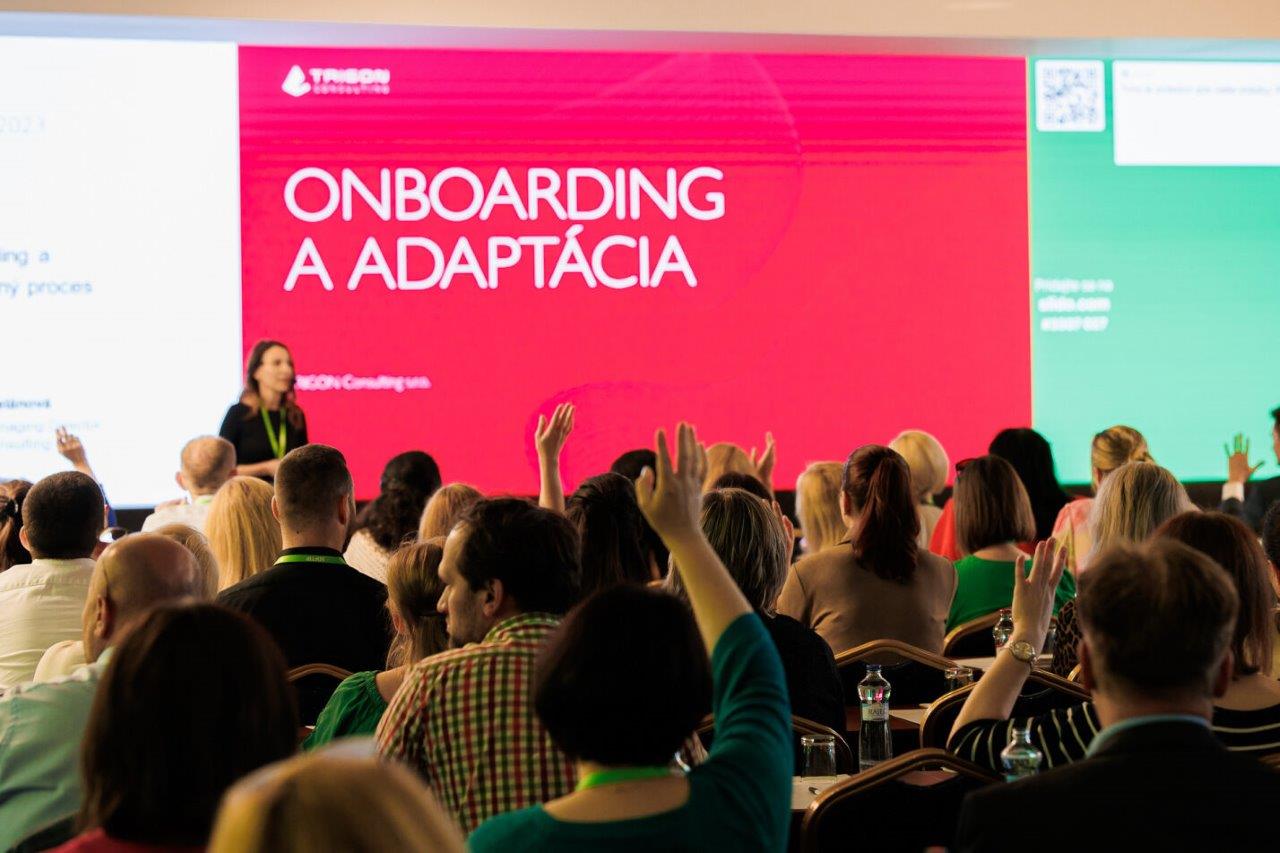In today’s fast-paced business world, the success of any organisation depends largely on the quality and effectiveness of its employees. As human resources professionals, we understand that attracting top talent is getting harder, but it’s still just the beginning of working with new people. Equally important is their retention and aftercare. One of the key elements of this process is a well-structured onboarding and adaptation programme for new employees. In this blog, we will discuss the importance of onboarding and adaptation.
Onboarding, which is often underestimated, is the process through which new employees acquire the necessary knowledge, skills and behaviours to become productive members of an organisation. Onboarding, on the other hand, focuses on helping employees integrate into the company culture and work environment. These processes are more than just paperwork and orientation meetings-they are an investment in the future success of your employees.
What do the statistics say?
Retention rates: research by the Society for Human Resource Management (SHRM) showed that 69% of employees were more likely to stay with a company for at least three years if they had a good onboarding experience .
Increase newcomer productivity: a Glassdoor study says that organizations with a well-managed and sophisticated onboarding system have 70% higher new employee productivity than companies without onboarding.
Cost savings: the cost of employee turnover is a significant problem for businesses. According to a survey by the Work Institute, it costs employers up to 33% of a worker’s annual salary to hire a replacement for an employee who left during the adaptation process. Investing in onboarding and adaptation can significantly reduce these costs.
Employee engagement is an increasingly frequent topic. Profesia’s survey of a sample of 1,000 respondents in the first half of this year showed that 34% of employees feel satisfied and motivated. Up to 39% of employees declare that they are demotivated and dissatisfied at work. A well-designed onboarding and onboarding program will help significantly increase employee engagement, leading to better performance and job satisfaction.
Alignment with company values: a survey by BambooHR found that 54% of employees who said their new job was not a good value fit left within the first year. Adaptation programmes help employees align with the values and culture of the organisation, reducing the likelihood of early departures.
The human element: it’s important to remember that there are real people behind these statistics. Effective onboarding and onboarding are not just about ticking boxes, but about making employees feel valued and welcome. A positive onboarding experience can lead to lasting loyalty and engagement.

Need help with onboarding and adaptation?
Key elements of effective onboarding and adaptation
Clear expectations: make sure new hires understand their roles, responsibilities and performance expectations from the start. On the other hand, it’s important to know the expectations of your new employees and align them with the position they are hired for.
Guiding the newcomer the right way: assign a mentor or buddy to guide new employees through their initial stages, giving them a sense of support and belonging, explaining relationships and guiding them through their first days on the job.
Adaptation manual: have material ready to guide the newcomer through the first months. An adaptation manual is a great help for a new employee and should contain information important for a quick orientation to the new workplace and a description of the individual steps of the adaptation programme.
Training and development: have a training system, both theoretical and practical, in place and clearly described. Explain it to the newcomer and make sure he understands and is ok with the system.
Feedback and communication: create a space to communicate openly enough with the newcomer and provide regular feedback to monitor their progress. Giving regular feedback is an often underestimated factor that can play a key role in whether a newcomer survives their probationary period and first year at a company. Simply put, if you like something – tell him, if you don’t like something – tell him too. And of course, ask for feedback from a newcomer, you can learn a lot and get inspiration.
And how do our newcomers Adriana and Samo perceive the adaptation in Trigon?
Adriana Briššová:
“From my point of view, adaptation is very important both on the part of the employee and the employer. During adaptation, both parties get to know each other and it is important that feelings and impressions are positive on both sides. It is important that the employee feels supported by his/her superiors and colleagues, that he/she is included in the team and is familiar with the work and activities that await him/her during the day. Personally, I am helped by the support of my colleagues, I try to help those around me and I try to have a positive influence on those around me. Collective and helpful colleagues are the basis for the adaptation of a new colleague. For me personally it helps a lot when I get trust, because I appreciate it and then I try even harder not to fail, on the contrary, to do everything I can to succeed and show that I have earned it.
Another important point and what helps me personally is to set goals , to know what I want to do and accomplish in the short term (meaning what I should know and accomplish this month , as well as in 3 months where I should be in terms of independence and goals and also a longer term goal that if I continue systematically where I would know where I would be a year from now.) This is important to me in terms of motivation, which I also consider an important point of adaptation. If the employee is motivated during the adaptation process, he/she will be more likely to integrate into the work activities and also into the team as much as he/she wants to keep progressing.
The best way I know how to adapt to new work activities is through practice. I can also say from past experience that you can’t learn anything as perfectly in theory as you can by actually trying it out, and the more times you do it, the better you’ll get at it. I liken it to my experience with sports (the more times I kicked the ball , the more perfect the kick was). When you do something for the first time it’s not perfect but when you do it for the fifth time it’s much better, for me there’s no better way of learning than learning by doing.
Of course, every adaptation comes with fears, about what to expect and whether I can handle it and whether my colleagues will be happy with me, but what helps me is that I still believe in myself and I’m brave. I always tell myself that the worst can happen to me and I figure I have nothing to worry about. It’s normal to be stressed and worried, but you always have to believe in yourself and keep trying 🙂“
Samuel Tatliak:
“Every organisation has its own culture. This includes the values of the organisation, the way people communicate, the dress code, working hours and other aspects. Learning how to function in this new culture is essential for effective collaboration in a new team. It is important to respect others and their functioning. I was worried about how I would fit into the new culture, mainly because of the age difference, because the man doesn’t lie. Despite these concerns, I have come to realise that building positive relationships with colleagues and supervisors is an integral part of adaptation. This can include learning to work with a new team, understanding team dynamics and fitting in with social activities or meetings.
Each company has its own set of standard procedures and rules. This can include everything from specific project management methodologies to more mundane but equally important aspects, such as completing a timesheet or requesting annual leave. Adopting these processes required my flexibility, as each company has its own unique set of processes.
Many tasks in a new job require the use of specific software tools or technologies. For example, a company may use certain project management tools, collaboration software or databases. In my adaptation I was learning to work with new software I had never worked with before, but as I have been working regularly with various other software for several years this was not a problem for me.
Change always brings a degree of stress, which is only natural. Everyone comes to a new job from a different background – someone from a different job, someone is a recent graduate and someone may still be studying. These changes can be challenging and stressful, which needs to be taken into account when adapting. Despite these challenges, I try to approach new situations with a positive attitude and thanks to the supportive atmosphere among my new colleagues,I have not experienced much stress.
I didn’t have concerns at first, but they slowly start to arise as the train gets going in earnest. Will I be good enough? Whether I can handle being productive long term, or whether I’ll get stuck on something. Sometimes these thoughts bother me too, but I try not to pay too much attention to them. In every new situation we may feel uncertainty or fear. Such feelings are normal and we wouldn’t be human without them, but it’s important to work with them.
What to add in conclusion?
As HR professionals, we are responsible for making sure that new employees feel comfortable and have a positive experience in their new workplace. In addition to the clear benefits in the form of higher productivity, reduced turnover and increased employee engagement, the secondary motivation (or primary?) should be to build the company’s reputation on the labour market. And this is best helped by positive employee testimonials.
If you are considering rethinking your adaptation programme or are still hesitant to implement such a programme in your company, we would be happy to provide you with our expert insight on this topic.”






